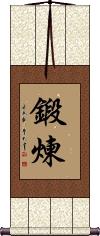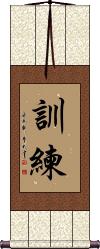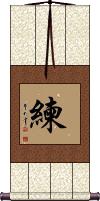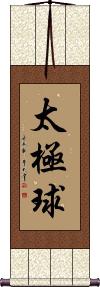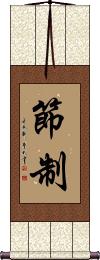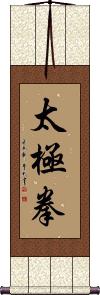Many custom options...
And formats...

Exercise in Chinese / Japanese...
Buy an Exercise calligraphy wall scroll here!
Personalize your custom “Exercise” project by clicking the button next to your favorite “Exercise” title below...
Exercise
(for body or mind)
鍛煉/鍛鍊 means to exercise in much the same way we use the word exercise in English.
This can be exercising your body at the gym or exercising your mind in studies. Most of the time, this refers to physical exercise.
This can also be translated as to temper, to toughen, to train, to drill, to forge, or simply discipline.
Training / Drill
If training or drill is important to you (especially for military drill and training), 訓練 might be just the thing for a drill master to hang behind his/her desk.
This term is universal in Chinese, Japanese Kanji, and old Korean Hanja. It can also mean practice or exercise, depending on context.
Practice / Train / Drill
練 is a Chinese, Japanese, and Korean word that is the simplest way to say practice, train, drill, exercise, or to describe the effort taken to perfect one's skill.
Tai Chi Ball
Discipline
鍛練 is the Japanese Kanji and Korean Hanja word used for discipline.
This has a meaning like “forging or creating something from lots of training and practice.” My Japanese dictionary translates this as “tempering, forging, hardening, disciplining, training.”
This is for Japanese and Korean only. In Chinese, these characters might be translated as (physical) “exercise.”


The modern form of the second Japanese Kanji looks like the first image to the right. There’s also an alternate modern form after that, and finally, an alternate traditional form. Because calligraphy is an art, the calligrapher could choose any of these possible forms. Let us know if you have a preference.
See Also: Self-Control | Will-Power
Moderation / Temperance
節制 means moderation or temperance in Chinese, Japanese Kanji, and old Korean Hanja.
Moderation is creating a healthy balance in your life between work and play, rest and exercise. You don't overdo or get swept away by the things you like. You use your self-discipline to take charge of your life and your time.
節制 can also be translated as sobriety or self-restraint.
This is often used as part of the Seven Heavenly Virtues to represent sobriety and/or temperance.
Tai Chi Chuan / Tai Ji Quan
太極拳 is the famous Taoist meditation and martial art exercise. The direct translation of these characters would be something like “grand ultimate fist,” but that does not quite hit the mark for what this title really means.
An early-morning walk through any city in China near a park or an open area will yield a view of Chinese people practicing this ancient technique.
A typical scene is an old man of no less than 80 years on this earth, with a wispy white beard and perhaps a sword in one hand. He makes slow moves that are impossibly smooth. He is steady-footed and always in balance. For him, time is meaningless and proper form, and technique is far more important than speed.
For the younger generation, faster moves may look impressive and seem smooth to the casual observer. But more discipline and mental strength are needed to create perfectly smooth moves in virtual slow motion.
Note: There are two ways to Romanize these Chinese characters, as seen in the title above. The pronunciation and actual characters are the same in Chinese. If you really used English sounds/words to pronounce this, it would be something like “tie jee chew-on” (make the “chew-on” one flowing syllable).
These search terms might be related to Exercise:
Discipline / Training / Tempering Character
Do Not Fear the Task: Cooperation Will Lead to Success
Fierce and Courageous Training Defeats the Strong and Protects the Body.
Karma - Cause and Effect
Maintain an Army for 1000 Days, Use It for an Hour
Practice / Train / Drill
Skill Acquired Through Hard Training
The More We Sweat in Training, the Less We Bleed in Battle
Training / Drill
Training / Practice / Cultivation
Use Hard Work to Overcome Adversity
Not the results for Exercise that you were looking for?
Below are some entries from our dictionary that may match your Exercise search...
| Characters If shown, 2nd row is Simp. Chinese |
Pronunciation Romanization |
Simple Dictionary Definition |
練 练 see styles |
liàn lian4 lien ren れん |
More info & calligraphy: Practice / Train / Drill(surname) Ren To train, practise, drill, exercise. |
忍耐 see styles |
rěn nài ren3 nai4 jen nai nintai にんたい |
More info & calligraphy: Patience / Perseverance / To Endure / Tolerant(noun, transitive verb) endurance; perseverance; patience forbearance |
太極拳 太极拳 see styles |
tài jí quán tai4 ji2 quan2 t`ai chi ch`üan tai chi chüan taikyokuken たいきょくけん |
More info & calligraphy: Tai Chi Chuan / Tai Ji Quan{MA} grand ultimate fist; Tai Chi Chuan |
ハービー see styles |
baapii / bapi バーピー |
More info & calligraphy: Herbie |
スパイダーマン see styles |
supaidaaman / supaidaman スパイダーマン |
More info & calligraphy: Spider-Man |
檢 检 see styles |
jiǎn jian3 chien ken |
to check; to examine; to inspect; to exercise restraint A case; rule; to collate; compose; pick up. |
例題 例题 see styles |
lì tí li4 ti2 li t`i li ti reidai / redai れいだい |
problem or question solved for illustrative purposes in the classroom; practice question (used in preparation for an exam); sample question example; exercise (for the reader) |
健身 see styles |
jiàn shēn jian4 shen1 chien shen |
to exercise; to keep fit; to work out; physical exercise |
出操 see styles |
chū cāo chu1 cao1 ch`u ts`ao chu tsao |
to drill; to exercise; to go outdoors for physical exercise |
執行 执行 see styles |
zhí xíng zhi2 xing2 chih hsing yuukou / yuko ゆうこう |
to implement; to carry out; to execute; to run (noun, transitive verb) (1) (しっこう, しゅぎょう only) execution; carrying out; performance; enforcement; exercise; service; conduct; (noun, transitive verb) (2) (しっこう only) {law} execution; (3) {Buddh} lead monk performing various tasks in a temple; (surname) Yūkou temple executor |
塑身 see styles |
sù shēn su4 shen1 su shen |
body sculpting (weight loss and exercise) |
実習 see styles |
jisshuu / jisshu じっしゅう |
(noun, transitive verb) practice (in the field); training (esp. practical and hands-on); practical exercise; drill |
對課 对课 see styles |
duì kè dui4 ke4 tui k`o tui ko |
to give answering phrase (school exercise in memory or composition) |
強身 强身 see styles |
qiáng shēn qiang2 shen1 ch`iang shen chiang shen |
to strengthen one's body; to keep fit; to build up one's health (through exercise, nutrition etc) |
忍讓 忍让 see styles |
rěn ràng ren3 rang4 jen jang |
to exercise forbearance; patient and accommodating |
懸垂 悬垂 see styles |
xuán chuí xuan2 chui2 hsüan ch`ui hsüan chui kensui けんすい |
to hang down; to dangle; to be suspended (n,vs,vi) (1) pull-up (exercise); chin-up; chinning; (n,vs,vi) (2) suspension; dangling; hanging |
拉筋 see styles |
lā jīn la1 jin1 la chin |
stretching (exercise) |
振う see styles |
furuu / furu ふるう |
(irregular okurigana usage) (transitive verb) (1) to swing; to wield (physically); to exert; (2) to exercise (e.g. power, ability); to exhibit; to display; to wield (metaphorically); (3) to flourish; to prosper; to thrive |
捲腹 卷腹 see styles |
juǎn fù juan3 fu4 chüan fu |
crunch (physical exercise) |
揮う see styles |
furuu / furu ふるう |
(transitive verb) (1) to swing; to wield (physically); to exert; (2) to exercise (e.g. power, ability); to exhibit; to display; to wield (metaphorically); (3) to flourish; to prosper; to thrive |
摺足 see styles |
suriashi すりあし |
(1) sliding feet; shuffling (one's feet); (2) (sumo) moving legs forward with feet never leaving the ground (exercise) |
操演 see styles |
cāo yǎn cao1 yan3 ts`ao yen tsao yen souen / soen そうえん |
drill; exercise; demonstration; to demonstrate (noun, transitive verb) {film;tv} puppeteering; practical effects |
收斂 收敛 see styles |
shōu liǎn shou1 lian3 shou lien |
to dwindle; to vanish; to make vanish; to exercise restraint; to curb (one's mirth, arrogance etc); to astringe; (math.) to converge |
放風 放风 see styles |
fàng fēng fang4 feng1 fang feng |
to allow in fresh air; to allow a prisoner out for exercise; to give out information |
晨練 晨练 see styles |
chén liàn chen2 lian4 ch`en lien chen lien |
morning exercise |
気功 see styles |
kikou / kiko きこう |
breathing exercise; breath control; spirit cultivation; chi kung; qigong |
活動 活动 see styles |
huó dòng huo2 dong4 huo tung katsudou / katsudo かつどう |
to exercise; to move about; to work out; shaky; unsteady; loose (tooth etc); movable; flexible; liquid (capital etc); (volcanic, seismic, economic etc) activity; (outdoor etc) activity; event; (political) campaign; (military) maneuver (CL:項|项[xiang4]); to use personal influence, connections, bribes etc (n,vs,vi) (1) activity (of a person, organization, animal, volcano, etc.); action; operation; (2) (abbreviation) (obsolete) (See 活動写真) moving picture |
深蹲 see styles |
shēn dūn shen1 dun1 shen tun |
squat (exercise) |
減脂 减脂 see styles |
jiǎn zhī jian3 zhi1 chien chih |
to burn fat; to lose weight (through diet or exercise) |
演習 演习 see styles |
yǎn xí yan3 xi2 yen hsi enshuu / enshu えんしゅう |
(military, firefighting etc) (verb and noun) drill; exercise; maneuver (n,vs,vt,vi) (1) practice; exercise; drill; (n,vs,vt,vi) (2) military exercise; manoeuvres; maneuvers; drill; (3) seminar |
Click here for more Exercise results from our dictionary
The following table may be helpful for those studying Chinese or Japanese...
| Title | Characters | Romaji (Romanized Japanese) | Various forms of Romanized Chinese | |
| Exercise | 鍛煉 / 鍛鍊 锻炼 | duàn liàn duan4 lian4 duan lian duanlian | tuan lien tuanlien |
|
| Training Drill | 訓練 训练 | kunren | xùn liàn / xun4 lian4 / xun lian / xunlian | hsün lien / hsünlien |
| Practice Train Drill | 練 练 | ren | liàn / lian4 / lian | lien |
| Tai Chi Ball | 太極球 太极球 | tai kyoku kyuu taikyokukyuu tai kyoku kyu | tài jí qiú tai4 ji2 qiu2 tai ji qiu taijiqiu | t`ai chi ch`iu taichichiu tai chi chiu |
| Discipline | 鍛練 / 鍛錬 锻练 | tan ren / tanren | duàn liàn duan4 lian4 duan lian duanlian | tuan lien tuanlien |
| Moderation Temperance | 節制 节制 | sessei / sesei | jié zhì / jie2 zhi4 / jie zhi / jiezhi | chieh chih / chiehchih |
| Tai Chi Chuan Tai Ji Quan | 太極拳 太极拳 | tai kyoku ken taikyokuken | tài jí quán tai4 ji2 quan2 tai ji quan taijiquan | t`ai chi ch`üan taichichüan tai chi chüan |
| In some entries above you will see that characters have different versions above and below a line. In these cases, the characters above the line are Traditional Chinese, while the ones below are Simplified Chinese. | ||||
Successful Chinese Character and Japanese Kanji calligraphy searches within the last few hours...
